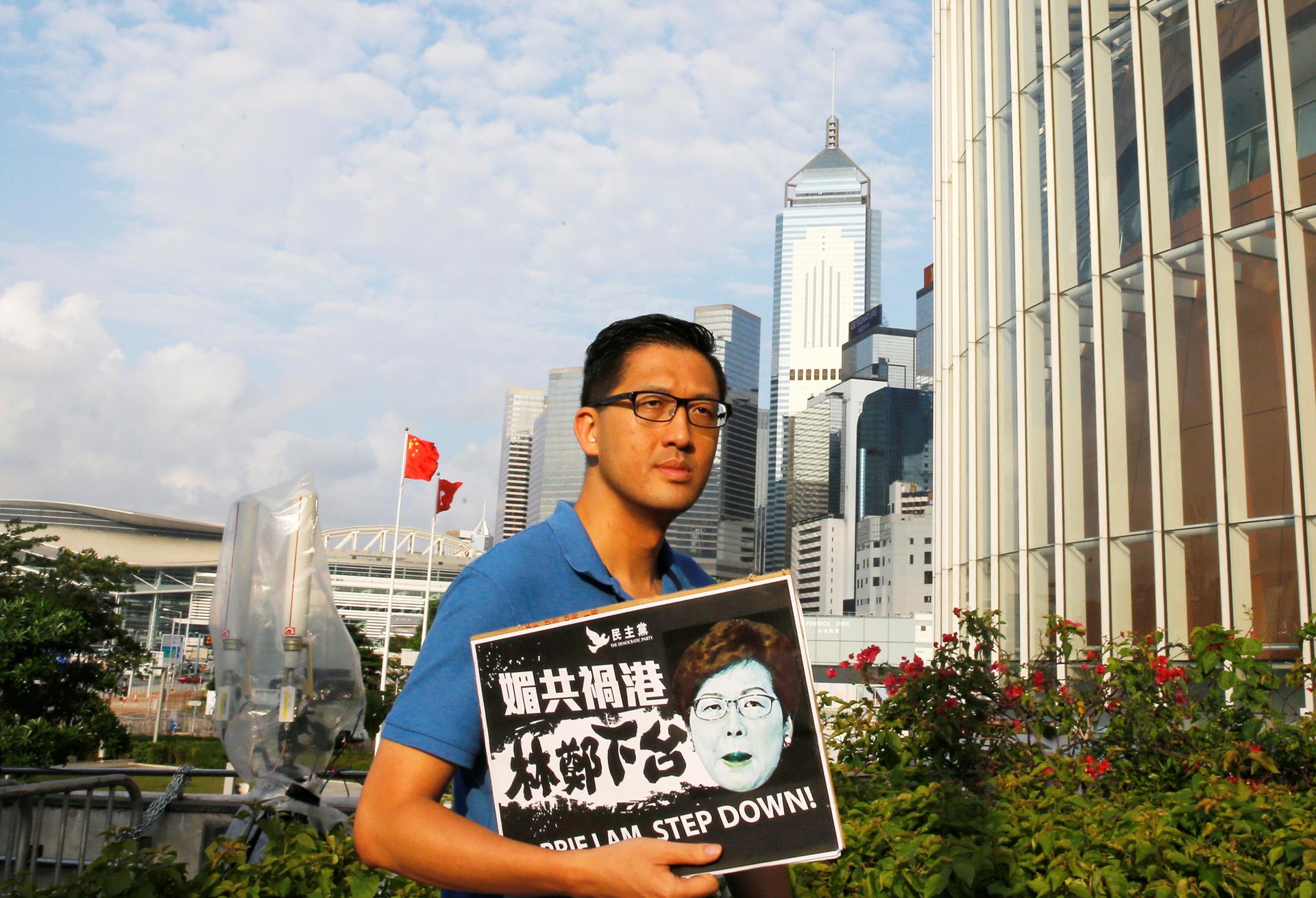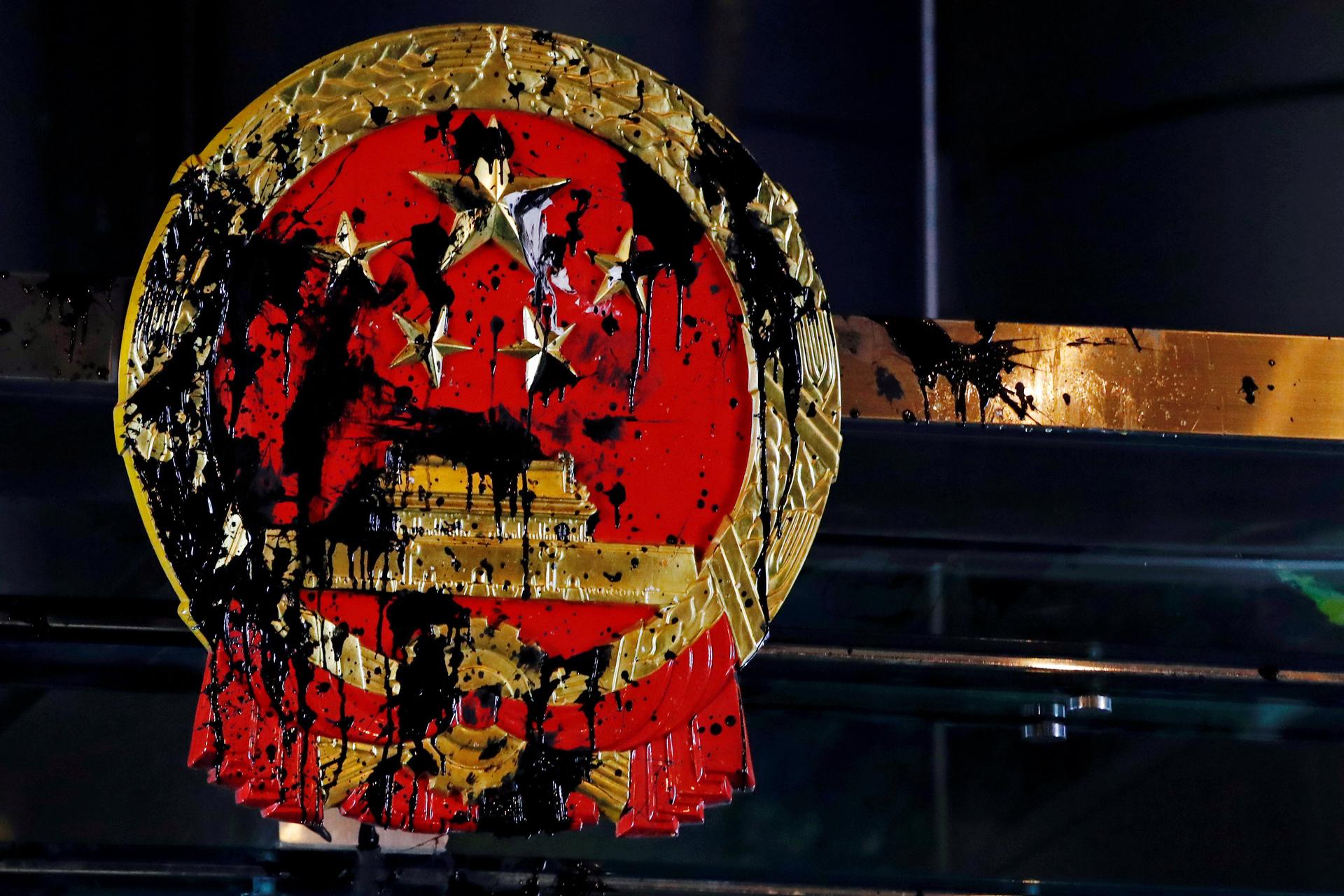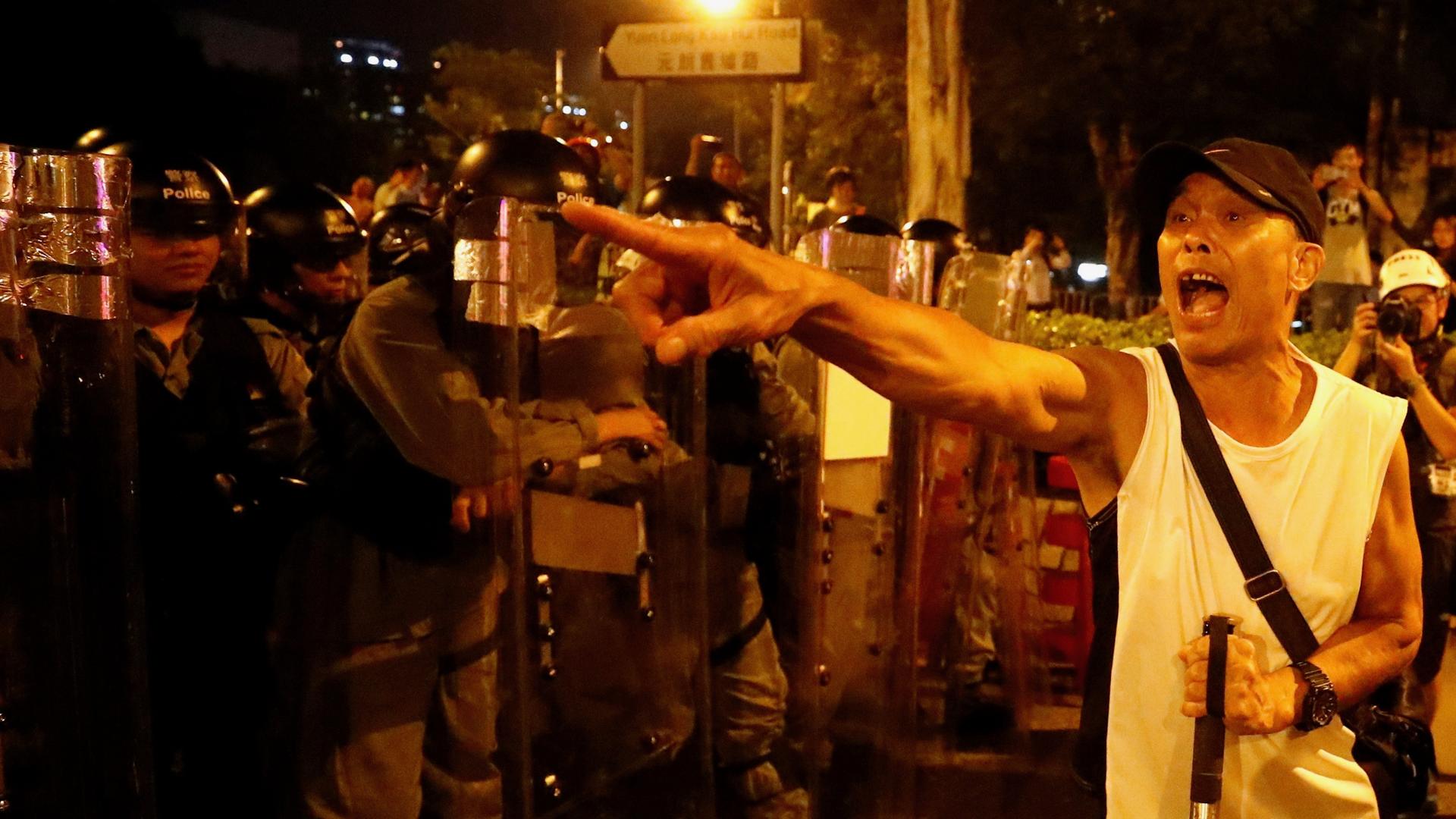Why Hong Kong’s secret societies are attacking protesters
Hong Kong is slipping into dysfunction so rapidly that, for its citizens, normality is being constantly redefined.
Slugfests between riot cops and black-clad protesters. Glitzy avenues lit up by flaming barricades. A DIY catapult heaving stones toward police. Just months ago, much of it would have been hard to imagine.
But 19 weeks into a “revolution” to loosen China’s grip over Hong Kong, this sounds like a fairly typical Saturday.
Related: How close are Hong Kong’s protests to China’s ‘red line’?
Here’s the latest grim milestone. An elected official, aligned with the protest movement, says local mafia have put a price on his head.
Underscoring this claim are strange attacks on his colleagues — other lawmakers, also opposed to Chinese state dominance, getting beaten down by mysterious men.
But that’s not the worst part.
This official, Lam Cheuk-ting, insists he can no longer rely on the cops for protection. Hong Kong’s police, he and other officials claim, are behaving like “servants” of crime syndicates loyal to Beijing — and thus “forcing people to defend themselves.”
So, Lam is ready to do just that. Fit and 42, he is practicing his self-defense moves, traveling only in groups and keeping a paranoid eye out for the “gangsters who want to ambush me. I do think I must be one of their main targets.”

If only it were easier for Lam to blend into a crowd. He is nearly 6 feet 4 inches — “quite tall for Hong Kong,” he said — and his face has been plastered on campaign posters.
His allegations, if true, are cause for despair. Since the 1980s, Hong Kong’s cops have been revered by its citizens and envied across much of Asia. They are the rare department that managed to purge the shakedowns and gangsterism that still plague police units throughout the region.
Yet, Lam contends that police are now “colluding” with organized crime — or “at least turning a blind eye” when thugs mete out raw violence toward protesters.
Related: PHOTOS: The masks of the Hong Kong protests
In Lam’s telling, many cops are so fed up with these Molotov cocktail-hurling protesters that — if gangsters want to crack a few traitors’ heads — they aren’t going to interfere.
“The police may think, ‘OK, those protesters are troublemakers.’ So, if they need police assistance? I will not offer any help.’”
“The police may think, ‘OK, those protesters are troublemakers,’” he said. “‘So, if they need police assistance? I will not offer any help.’”
The claim, at a glance, feels counterintuitive. Why would Hong Kong’s mafioso take time away from extorting shopkeepers and dealing heroin to beat down protesters?
But beneath Hong Kong’s surface are complex power dynamics — a world where gangsters can be pro-China patriots and, for crime bosses, terrorizing a protest might actually be a smart investment.
Anatomy of a triad attack
Lam was raised in Hong Kong’s New Territories, a hilly stretch of terrain along the border with China’s mainland. It’s a place that feels distant from the sparkle and neon evoked by the words “Hong Kong.”
The streets surrounding Lam’s office are lined with simple, cement-walled shops, many selling gadgets and milk formula to day-trippers from China proper. This area is called Shek Wu Hui. It’s a neighborhood Lam represents for Hong Kong’s Democratic Party, which is defined by its wariness of Beijing.
Related: Hong Kong leader says she would quit if she could
Certain parts of the New Territories, Lam says, are flush with triads: Chinese secret societies, some of which trace their origins back hundreds of years. They are illegal brotherhoods, steeped in organized crime, with a reputation for leaving their enemies bloody.
Lam knows this all too well. He used to be an investigator with Hong Kong’s anti-corruption squad. Known as the Independent Commission Against Corruption, its core mission is hunting down dirty cops and nabbing officials mixed up with the underworld.
But his most recent clash with triads went down on July 21 — a night that is now infamous in Hong Kong. It was perhaps the most disturbing triad attack in Hong Kong’s recent history.
For Lam, it all started with a text message delivered via WhatsApp. A constituent pinged Lam to tell him a throng of scary-looking men were gathering outside a nearby train station. Lam quickly phoned a contact inside the police force. Don’t worry, he was told; officers would be there soon.
Then, Lam and his assistants hurried over to the station, located in an area called Yuen Long. They saw “more than 100 gangsters,” all wearing matching white T-shirts, and gripping “batons, steel bars and wooden sticks.”
The men were menacing a crowd of people who’d just returned, via train, from raucous protests in the city’s center.
That downtown rally had indeed been a wild one. The bulk of Hong Kong’s protesters exude a peace-march vibe, but there is a youthful vanguard that is always keen to provoke. That night, the vanguard had broken a grave taboo: spraying revolutionary graffiti on Beijing’s central liaison office — the official conduit through which China’s Communist Party exercises its power in Hong Kong.
Images of the vandalism quickly circulated online — including photos of China’s national emblem dripping with black paint.

Perhaps that is what incensed the white-shirted mob, clenching their weapons as they encircled the passengers arriving at Yuen Long train station. Lam’s assistant, streaming on Facebook Live, captured the moment they surged forth and smashed everyone in sight with their clubs.
youtube://v/GvWnEU_PW6MIn the video, shrieking echoes off the station’s tile floors as passengers flee to the train carriages. They cowered inside the train, one man dropping to his knees to plead for mercy.
But the mob did not relent.
Related: How Hong Kong’s protests are affecting its economy
“That,” Lam said, “was the most horrifying moment of the attack.”
He, too, was battered in a storm of baton strikes. By the time the mob was done, blood spattered the floor and nearly 50 were injured. Blood trickled from the side of Lam’s mouth and his right hand, held aloft to block swinging rods, was riven with bone fractures.
And where were the police? Lam and many others had deluged them with calls — and yet, as the gangsters swarmed the station, they only sent a few officers who scanned the scene and left.
The excuse offered by senior officers is that cops were deployed across Hong Kong, stretched too thin by the protesters’ bedlam to adequately thwart the attacks or even arrest gangsters as they fled.
But that rationale is strained by photos, taken outside the station, which show officers chatting with two white-shirted men gripping clubs. In the ensuing days, hundreds of civil servants, from more than 40 departments, warned police in a letter that they’d caused “the public to suspect the government colluded with triads.”
When a handful of attackers were finally arrested, police conceded the men belonged to Wo Shing Wo and 14K — two of the most notorious triad societies in the world.
Violence for profit
Triads will do pretty much “anything that makes money.”
So says Sharon Kwok, a criminologist with Western Sydney University. Born and raised in Hong Kong, she specializes in triads — a line of work that has required her to spend many hours in their company. (A triad dinner, she says, can stretch into an epic, eight-hour feast, where deals are cut and the machismo runs hot.)
Related: They were CIA-backed Chinese rebels. Now you’re invited to their once-secret hideaway.
Triads are secret societies originating in mainland China. The oldest sects can trace their beginnings to the 17th century, but then and now, a triad sect is essentially a clandestine fraternity. Each gang obeys a hierarchy, ruled by a commander known as the “dragonhead.” Leaders go by names such as “Broken Mouth” or “The Shanghai Kid.”
There are rituals and oaths and elaborate initiation ceremonies — but all of this is waning in modern times, Kwok says. Behind the mystique are entrepreneurial networks focused on profit.
Their “core business,” she says, is running protection rackets. Other enterprises include gambling dens, sex trafficking and drug sales. Triads also own legal operations, Kwok says, such as real estate development, funeral services, bus routes and catering.
“Also contract violence,” she said. “That’s very common among triads.”
Unlike American gangs, Hong Kong triads seldom rely on firearms. A police sweep of a triad den might turn up metal batons, “knuckle dusters” (brass knuckles) and knives.
Anyone on their hit list may be tracked by masked men and then carved up or kicked in the skull. Some victims die, many walk away. In the most recent triad-style attack, a colleague of Lam’s — fellow lawmaker Roy Kwong — was beaten down by three men in broad daylight as a fourth filmed, as if documenting the attack for a client. (Kwong was hospitalized, but has since been released.)
So, it’s conceivable that triads are being paid to attack lawmakers, Kwok says, or that they’d launch full-on melees against protesters for the right price. The latter proposal, she says, would likely be presented to a senior triad, who would then recruit willing attackers from his rank-and-file.
“[Hong Kong’s triads] are very patriotic and regard these protesters as people trying to overthrow Chinese rule … and they hate them.”
Finding takers might be easy, she says. Hong Kong’s triads “are very patriotic and regard these protesters as people trying to overthrow Chinese rule … and they hate them.”
Pro-China sentiment has coursed through Hong Kong’s triad sects for decades. This is no accident. The Chinese government has actively worked to “recruit triads to the communist camp,” according to a study that Kwok co-authored.
Former Chinese leader Deng Xiaoping, speaking of Hong Kong’s triads, once said “these black societies are very powerful … and there are many good guys among them.” These gangsters were even easier to win over once mainland China’s prosperity shot up — and triads rushed to set up operations across the Hong Kong-China border.
Triads have also sought favor with the pro-Beijing political elite in Hong Kong, a clique that pretty much runs the territory and has the power to make or break fortunes.
Impressing this crowd, Kwok says, could incentivize a triad gang to smash protesters without receiving any payment at all. “The triads might want to make it explicit,” she said, “letting everyone see they’re patriotic. That’s good for business — and a good way to open up new business opportunities.”
The assault certainly pleased one of Hong Kong’s more prominent pro-Beijing politicians, Junius Ho, who was actually filmed shaking hands and cheering on the white-shirted mob that very night. He even called them “heroic” and praised their “hard work.”
Moreover, such an attack would grab the attention of the highest power in the land: China’s Communist Party. In fact, one week before the attack, an official from the party’s liaison office in Hong Kong emboldened locals to cast out dissidents.
In a speech at Yuen Long, not far from the gangster ambush, the Chinese official — named Li Jiyi — spoke of the “wind and rain in Hong Kong,” an allusion to the protesters. “We won’t allow them to come to Yuen Long and cause trouble,” he said, according to Reuters.
“Even though there are a group of protesters trained to throw bricks and iron bars,” Li said, “we’ll have a group of Yuen Long residents with the persistence and courage … to protect our home.”
Does this definitively prove murky state collusion with the triads who savaged people inside that train station?
Not exactly. That’s why Lam and his colleagues demand a full investigation. This syncs with one of the protesters’ core demands: a total police overhaul that flushes out every abusive officer or any commander entangled with local mafia.
Kwok’s research suggests this endeavor would be messy. Hong Kong’s police are legally allowed to nab suspected triads at any time — even if they simply possess triad paraphernalia. There’s even a dedicated Organized Crime and Triad Bureau.
But in practice, she says, police officials maintain relationships with mobsters, using them as their eyes and ears on the streets — especially in neighborhoods where the triads see everything that moves.
“These triads are important surveillance networks — not just for criminal activity, but for political activity. So, it’s very important for the police to have contacts inside the triad networks. It’s for both controlling them and collecting intelligence, as well.”
“These triads are important surveillance networks — not just for criminal activity, but for political activity,” Kwok said. “So, it’s very important for the police to have contacts inside the triad networks. It’s for both controlling them and collecting intelligence, as well.”
Meanwhile, the feistier wing of the protest movement is not waiting patiently for some grand investigation into police-triad collusion. They’ve gone vigilante — smashing up shops, such as this mahjong parlor, which they believe to be run by gangsters.
And when protesters see a cop on the streets, they’re now apt to start shouting the words “hak se wui,” a Cantonese phrase for triads that literally means “black society.”
They’ve also spray-painted the numbers “721” all over Hong Kong — an allusion to July 21, the date of the train station blitzkrieg.
That incident appears to have had a radicalizing effect, further evaporating trust in police and nudging many to embrace more aggressive tactics. Even one Amnesty International Hong Kong board member, Johnson Yeung, conceded on Twitter that the attack had him toting a PVC (polyvinyl chloride) pipe, hoping to seek vengeance on triad thugs.
“Hong Kong is in a state of emergency,” Yeung wrote, “and the law that was once respected by its citizens is melting.”
This is not an overstatement. Hong Kongers’ distrust of law enforcement is a full-blown crisis. Roughly half the population now has zero faith in the police, a sentiment that was rare only months ago.
The territory, once a paragon of clean governance, is now a place where many locals see cops not as their defenders, but as adversaries — with the diehards describing them as de facto agents of Beijing.
Count Lam among the disaffected. He believes police injustice is the “cancer” of Hong Kong and fears that, if the movement is defeated, “our next generation could not live freely. Hong Kong might become the next Xinjiang.”
Contacts in Hong Kong’s intelligence world warn him that gangsters have placed a price on his head — perhaps not to kill him, but to leave him wounded, the same fate that has recently fallen upon his lawmaker colleagues. Yet, even as an elected official, he does not feel safe turning to law enforcement for protection.
So, Lam imparts, rather cryptically, that he now walks the streets with a backpack. Inside, he keeps an object that might help him fend off assailants.
Asked to elaborate, Lam says that he’d not reveal the contents publicly.
“But I am well prepared,” Lam said, “for any attack.”
